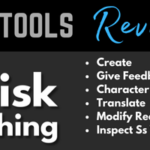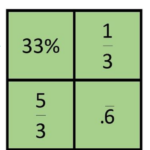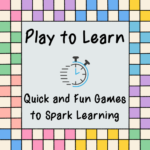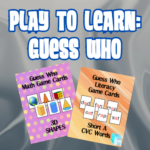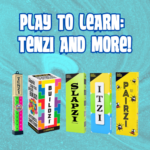AI Tool: Brisk AI – A Powerful Tool for Educators and School Librarians
“We want people to learn and be comfortable with technologies that they might not have as much experience with, and to see the library as a safe place for that exploration,” Dr. Carla Hayden once said. This insight truly resonates now that I have discovered Brisk AI. In one seamless extension, I can integrate AI across my go-to websites, PDFs, Google Slides, and Docs—generating everything from quick assessments in Google Forms to interactive lessons drawn from YouTube. It is a genuine game-changer for my day-to-day tasks as a librarian and educator.
Which One Doesn’t Belong? A Math Activity for Every Learner
Which One Doesn’t Belong? (WODB) is a simple activity with big benefits. Whether you’re teaching kindergarteners or high schoolers, WODB creates opportunities for every student to engage, think critically, and share their ideas. With no single “correct” answer, this activity encourages creativity and conversation, making it a go-to for classrooms everywhere. What is WODB? wodb.ca At its core, WODB presents four objects—numbers, shapes, or images—and asks students to decide: Which one doesn’t belong? The twist? Every object could “not belong,” depending on the reasoning. For example, a set of numbers might include 4, 9, 12, and 16. One student might…
Play to Learn: Quick and Fun Games to Spark Learning
International Games Month is the perfect time to celebrate how games can transform learning into an engaging and meaningful experience. Whether you’re looking for a quick classroom activity or a fun family game night, these short, educational games deliver big on fun and skill-building. I recently brought these games to the Association of Mathematics Teachers of New York State Annual Conference, where they were placed around the room during the opening night cocktail hour. They were a HIT! Here’s a roundup of some fantastic options: 1. Tsuro In this beautiful tile-laying game, players guide their markers along paths, aiming…
Unlocking Student Success: Integrating Literacy Skills to Master Next-Gen Science Standards
Are your students struggling to meet the Next Generation Science Standards? One of the biggest obstacles isn’t just content knowledge—it’s the ability to make inferences. This essential skill is often overlooked, yet it’s a game changer when it comes to understanding complex scientific concepts. By integrating literacy strategies, like inferencing, into your science instruction, you can help students connect their background knowledge with evidence and build the reasoning needed for deep comprehension. Ready to empower your students to think critically and ace those performance expectations? Dive into our latest post for practical tips and tools to make it happen!
Is AI the New Napster?
Curious about the wild frontier of AI and how it echoes the early, chaotic days of Napster and torrent sites? Imagine a world where AI, fueled by endless data—including copyrighted content—generates art, music, and stories without clear rules or permissions. From lawsuits against AI companies to concerns about deep fakes and content creators’ rights, we’re at a tipping point that could reshape the future of creativity and information. Dive into this article to explore the ethical questions and the urgent need for regulation that could either harness AI’s potential—or let it run wild.
The Evolution of Mathematics: What is a Ten Frame?
Continuing our series on The Evolution of Mathematics, let’s dive deeper into understanding why the math we’ve always done—and the algorithms behind it—work the way they do. In our initial post, we explored the idea that while math itself hasn’t changed, our approach to teaching it has shifted to emphasize understanding why algorithms work, rather than just how to perform them. In this post, we’ll focus on some effective strategies teachers are using to help students grasp these concepts on a deeper, more conceptual level. Let’s start by exploring the foundational tool of the ten frame. What is a ten…
Math Books That Inspire: My Current Reads and Future Picks
As a passionate math educator, I find inspiration not only in the classroom but also within the pages of thought-provoking books. Whether it’s deepening my understanding of complex concepts or discovering new teaching strategies, math books have a special way of expanding both my knowledge and approach. In this post, I’m excited to share with you the math books currently on my nightstand, as well as a few that are next on my reading list. From insightful explorations of mathematical theory to practical guides for classroom instruction, these reads offer something for every math enthusiast or educator looking to spark…
Embracing the Fidget: Fidget Deals for the New School Year!
It is great to be back to the blog, after our end of summer break! I hope you all had a wonderful rest of your summer and were able to recharge before the beginning of the school year. The beginning of the school year is all about setting expectations within the school building and classrooms or teaching areas. In my last post, I explored how incorporating fidgets into professional development sessions can help educators better understand the potential of fidgets in the classroom. I also shared some favorite fidgets, offering practical options to enhance focus and engagement for both students…
Play to Learn: Guess Who
Guess Who– one of the games we all grew up playing and that we probably have in our game closets, if we have kids. The classic game is a fun way to practice deduction, observation, and strategic questioning skills. Just a quick review of the simple rules of the game Each player randomly selects one character from a separate pile of cards. The goal is to guess the opponent’s chosen character by asking yes-or-no questions about their character’s features. Players take turns asking yes or no questions. Players eliminate characters on their board who don’t match the given features. The…
Play to Learn: Tenzi and More!
Today in the Play to Learn series, we are deep diving into the TENZI family of games! We will begin with the original TENZI game, that began this collection of games. TENZI is an exciting and quick-paced dice game that promotes fast reactions and is very easy to learn. To play TENZI, you roll your 10 dice as quickly as possible. The game comes with instructions for eight additional variations, including SPLITZI, MEGA TENZI, and TENZI TOWER. Playing TENZI helps children develop rapid and confident number recognition while being highly enjoyable and straightforward to play. It’s ideal for early finishers…

